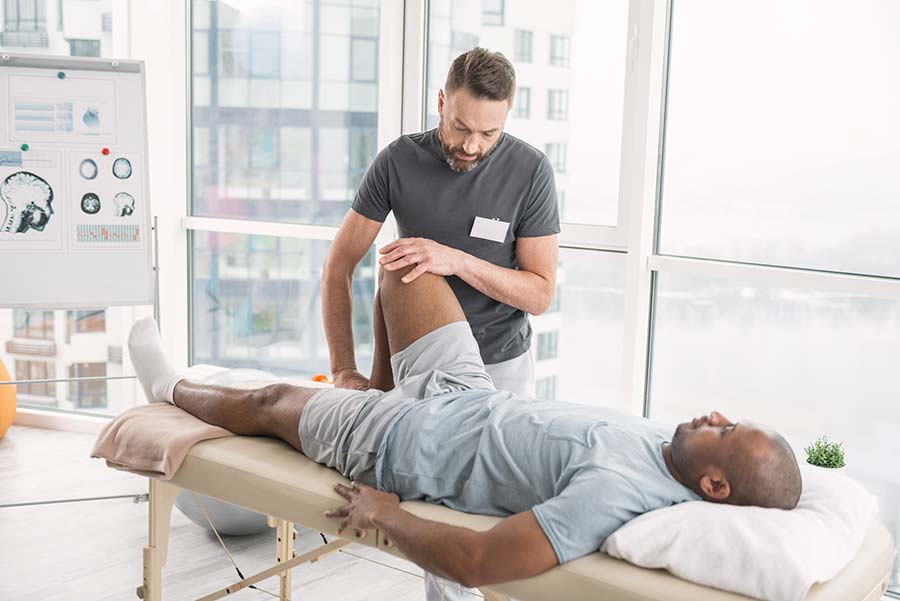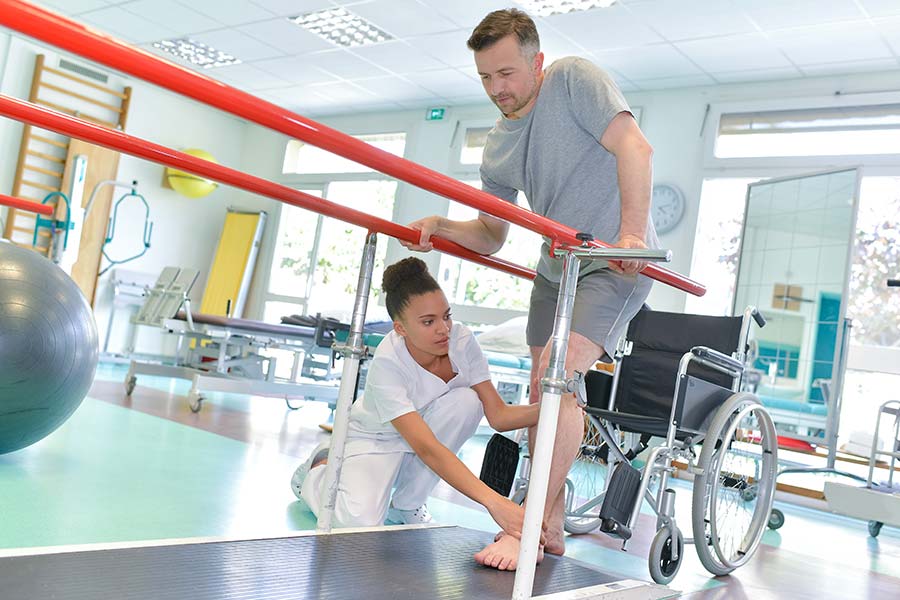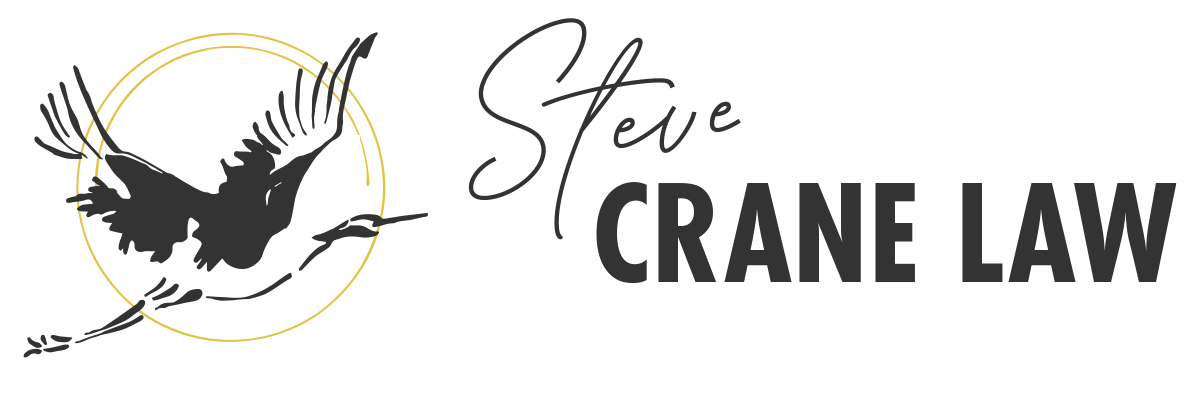Medical Treatment and Vocational Rehabilitation
Workplace injuries can be overwhelming, both physically and emotionally. At the forefront of the recovery journey is the right to proper medical treatment.
Medical treatment under the guise of worker’s compensation refers to the necessary medical care you receive following a work-related injury or illness.
As an experienced lawyer, Steve can gauge when it makes sense to go to court. He knows that a letter or phone call — with proper wording and timing — can be more effective or cost-efficient than suing for damages or injunctive relief.
For those cases that must be presented to a judge or jury, he is eminently qualified to assert your interests.
If you have sustained a workplace injury, call attorney Steve Crane free. He and his team can assess the facts of your case and help you determine the best course of action to move forward.
To schedule a discrete and confidential consultation about your matter, call attorney Steve Crane free at (888) 855-4400.
Did you know that you are entitled to medical treatment benefits if you are injured on the job?
In California, all employers, regardless of the number of employees they have, are required by law to carry workers’ compensation insurance for their employees; this means every employer in California must have workers’ comp coverage.
This requirement is mandated by California Labor Code Section 3700.
Even if an employer only has one employee, they must still carry workers’ compensation insurance.
Workers’ compensation covers medical expenses, temporary disability benefits, and other benefits for work-related injuries and illnesses.
Injuries must occur during the course of employment at a worksite to be eligible for benefits. Employees are not entitled to benefits if their injuries result from intentional and willful misconduct.
In California, injuries sustained at company-sponsored events may be covered by workers’ compensation if the event was mandatory or the company had a high level of sponsorship:
- Mandatory attendance: If employees were required to attend or had a reason to believe attendance was mandatory, the injury is likely covered.
- Company sponsorship: If the company mostly sponsored the event, the employer’s level of responsibility increases. For example, if the company sent invitations to the event, it’s more likely to be considered work-related.
- Event frequency: If the event happens regularly at the same time and place, it can be argued that it’s an essential part of the work culture.
Workers’ compensation does not usually cover injuries sustained during voluntary recreational activities. However, there are some exceptions, such as if the employee reasonably believed their participation was required by the employer.
Employees commuting to and from work are generally not covered. However, coverage applies if travel is an integral part of the job or if the employee is on a special mission.

What benefits am I entitled to?
California’s laws outline benefits for injured workers across four key categories:
The following outlines the benefit entitlements of injured workers in the state of California. Note that all payments and non-cash benefits received are tax-exempt, which is different than for other benefits, such as unemployment.
Medical treatment costs, including associated expenses related to medical treatment, are covered by the worker’s compensation programs. This includes costs of medical evaluations, treatments, and surgery. Likewise, prescription drugs, medical aid devices, and transportation costs to seek treatment are also covered. California workers are reimbursed for traveling to medical appointments at the IRS mileage rate: 67 cents per mile, effective January 1, 2024.
Temporary disability payments, which are paid to an injured worker for time off work stemming from an injury. Payments are made based on two-thirds of the average weekly wage of a worker, with state-mandated weekly maximums, depending on your date of injury. You can be paid temporary disability payments for a maximum of two years after your date of injury (technically, up to 104 weeks within a 5 year period), unless you suffer from one of the following conditions (in which case you are entitled to 240 weeks of temporary total disability payments):
- hepatitis B or C
- HIV
- amputation
- severe burns
- certain eye injuries
- pulmonary fibrosis, or
- chronic lung disease.
-
Permanent disability payments, which are payments made to workers whose injury affects their ability to return to their former job or to participate in the job market. The amount paid out is according to a permanent disability rating, which varies depending on the injury sustained, the age of worker, the worker’s occupation, and doctor’s restrictions. Depending on your disability rating, you may receive permanent disability payments anywhere from four weeks to 14 years.
Life pension payments, for workers who are severely disabled (70% – 99% rating of permanent disability). This is a small weekly payment in addition to the weekly permanent disability payments, but you can receive the life pension payment for the rest of your life.
Vocational retraining costs, called the Supplemental Job Displacement Benefit, are available to workers who can no longer return to their previous job and whose employers did not offer them alternative or modified employment. The retraining benefit is a $6,000 voucher for education-related retraining at state-approved schools. The voucher covers school tuition, fees, and books.
Death benefits, owed to dependents or spouses of workers killed while engaging in work-related activity, including burial expenses.
Worker Recovery and Entitlements Outside of Worker’s Compensation
Depending on the nature of your worker’s compensation claim and related injuries, workers may be entitled to recover other forms of benefits outside of the worker’s compensation program, including state disability insurance benefits (SDI), Social Security disability benefits (SSDI), or court judgments or settlements from a lawsuit against a third party.

How do I obtain medical treatment if injured on the job and ensure I received proper care?
- If injured, seek medical care immediately. For emergencies, head to the nearest emergency room.
- Notify your employer about your injury and the medical care you’re receiving.
- Keep all medical reports, prescription notes, and any other relevant health information.
- Follow prescribed treatments and medications is essential for both your recovery and your claim’s success.
- File a worker’s compensation claim to ensure coverage of your medical expenses. Seek assistance if you’re unsure about the process.

What treatment am I entitled to?
In California, workers’ compensation provides medical treatment to help recover from work-related injuries or illnesses:
Medical treatment
- Orthotic and prosthetic devices and services Includes:
- Doctor visits
- Other treatment services
- Tests
- Medicines
- Equipment
- Travel costs
- Nursing
- Medical and surgical supplies
- Crutches and apparatus
Treatment guidelines
Doctors must follow the medical treatment utilization schedule (MTUS).
Utilization review
Employers and claims administrators use a utilization review (UR) program to decide whether to approve medical treatment.
Predesignating a doctor
If you predesignate your personal physician or medical group before you are injured, you can have them treat you.
Other benefits of workers’ compensation include:
- Temporary disability benefits: Payments if you lose wages because your injury prevents you from doing your usual job
- Permanent disability benefits: Payments if you don’t recover completely
- Supplemental job displacement benefit: A voucher to help pay for retraining or skill enhancement
- Death benefits: Payments to your dependents if you die from a job injury or illness
- Burial expenses: Provided with death benefits
- Education-related cost reimbursement: A voucher capped at $6,000
If you’re injured at work, you should:
- Get emergency treatment if needed
- Tell the medical staff that your injury or illness is job-related
- Contact your employer for further instructions if you can safely do so

What are my employer’s responsibilities to me?
In California, your employer is responsible for providing workers’ compensation insurance, which means they must cover medical expenses, lost wages, and rehabilitation costs if you suffer a work-related injury or illness; they must also provide you with a claim form within one working day of reporting an injury, authorize initial medical treatment, and facilitate your return to work through modified duties when appropriate.
Key points about your employer’s responsibilities under California workers’ compensation:
Insurance coverage: Your employer must carry workers’ compensation insurance to cover work-related injuries and illnesses.
Reporting injuries: Employers are required to report all work-related injuries to their insurance company, even minor ones.
Claim forms: Upon reporting an injury, your employer must provide you with a workers’ compensation claim form within one working day.
Medical treatment: Employers must authorize initial medical treatment for your injury, including access to emergency care if needed.
Communication with you: Your employer should stay in touch with you regarding your injury and the claims process.
Modified duty: If possible, your employer must provide modified work (light duty) to help you return to work while recovering from an injury.
Information about rights: Employers must provide you with information about your rights and benefits under workers’ compensation law

What if my medical treatment is denied?
If your medical treatment is denied in California, you can:
- Request an Independent Medical Review (IMR)
An IMR is a review by an independent doctor who is not affiliated with your insurance company. You have 30 days to request an IMR after your denial. - Request a Qualified Medical Evaluator (QME)
A QME is an independent doctor appointed by the state to examine injured workers. - Appeal the decision
If the IMR or QME supports your claim, you can appeal the insurance company’s decision. - File a case
You can file an Application for Adjudication of Claim at a DWC office. The DWC office will decide your case without a jury. - Apply for State Disability benefits
If your temporary disability is denied or delayed, you may be able to get State Disability benefits from the California Employment Development Department (EDD). You should contact EDD at 1-800-480-3287 for forms and information. - Request a penalty payment
If the claims administrator delays or denies treatment without a reasonable excuse, you could be awarded a penalty payment of up to 25% of the value of each service that was delayed or denied. You can contact the Information & Assistance Unit at 1-800-736-7401 for help.
If you have sustained a workplace injury, call attorney Steve Crane free. He and his team can assess the facts of your case and help you determine the best course of action to move forward.
To schedule a discrete and confidential consultation about your matter, call attorney Steve Crane free at (888) 855-4400.12
Attorney Steve Crane and Attorney Kleinman operate separate law practices, even though they share the same office address at 14546 Hamlin Street, Suite 107, Van Nuys, CA 91411.
QUICK LINKS
Did you know that you are entitled to medical treatment benefits if you are injured on the job?
What benefits am I entitled to?
How do I obtain medical treatment if injured on the job and ensure I received proper care?
What treatment am I entitled to?
What are my employer’s responsibilities to me?
PRACTICE AREAS
